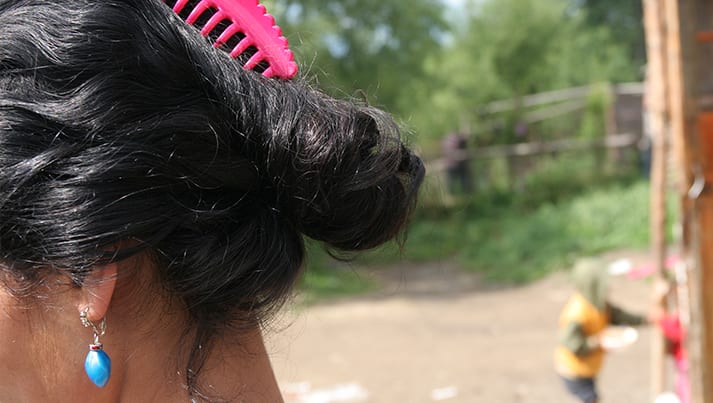Roma Women Speak Out

Roma women share their experiences of discriminatory treatment in reproductive health care settings in Slovakia.
Segregation. Racial harassment. Physical restraint and neglect during childbirth. Roma women in Slovakia speak about their experiences of discrimination and abuse in reproductive health care facilities. Together with the Slovakia-based non-governmental organization Poradňa pre občianske a ľudské práva, we interviewed dozens of Roma women from marginalized communities in eastern Slovakia for a new report, Vakeras Zorales – Speaking Out: Roma Women’s Experiences in Reproductive Health Care in Slovakia
Here are two of their stories.
Viola
Viola is a 28-year-old, married Roma woman with two children. Viola told us about verbal abuse, and humiliation that she experienced in hospital or during visits to her gynecologist’s office. Upon every visit, she felt that staff favored non-Roma women over Roma women. She often observed that Roma women were seen only after non-Roma women in the waiting room were attended to.
Viola also detailed how Roma patients were often insulted and yelled at, especially Roma women living in poverty. “They [medical staff] openly show that they hate Roma, that Roma are trash, that Roma are dirty. That is what they say, that Roma people are dirty, stinky and other nasty things,” said Viola.
Viola explained that the mistreatment she experienced while giving birth was by far worst of all. While giving birth to her first child, she said she was given no support or pain relief to help with her delivery. Instead, she said she was hurled insult after insult. She also said that she experienced segregation in the maternity department: “Roma women only have two rooms. These are only for Roma women, while white women have more rooms and there are only about two of them in a room. Roma women have four beds in one room and six or eight beds in the other one… Also, we have a separate dining room…Roma women don’t eat where the white women do.”
“If they treated us in a normal way, like they do white women, giving birth would definitely be better,” said Viola. “I have two children, but I don’t want to give birth anymore because of what I’ve experienced there. It’s just awful…it’s horrible there.”
Marianna
Marianna is a 31-year-old mother of three who also told us about her experiences of mistreatment in reproductive health care settings in Slovakia. For example, segregating Roma women in maternity departments was a practice Marianna said that she not only witnessed, but experienced herself. Being placed in a separate “Roma-only room” that was not as sanitary or clean as the rooms designated for non-Roma women made Marianna feel upset and humiliated. She also reported that unlike non-Roma women, Roma women were often forced to share beds or sleep in the corridor on stretchers when the maternity department was overcrowded.
“You see how [they] behave, you can feel it because you know how that same person treats white people and how they treat you,” said Marianna. “You can feel it, you can see that they discriminate against [you], that they make distinctions.”
Marianna also described being upset at having numerous medical personnel, including several students, present during labor despite her objections: “I didn’t like that there were several trainees and that they all came in and watched and felt my belly,” said Marianna. “I told the doctor I didn’t want them to touch me, that I didn’t like it. He didn’t listen. There were about ten of them and they all watched. It was unpleasant.”
As Viola and Marianna’s stories suggest, discriminatory conditions as well as degrading and abusive treatment in reproductive health care settings are identified as a common experience by many Roma women from marginalized communities in Slovakia. The stories of the women documented in Vakeras Zorales-Speaking Out indicate the need for meaningful action by Slovak authorities to ensure that Roma women receive quality health care, free from discrimination.
Read the complete report, Vakeras Zorales – Speaking Out: Roma Women’s Experiences in Reproductive Health Care in Slovakia.
